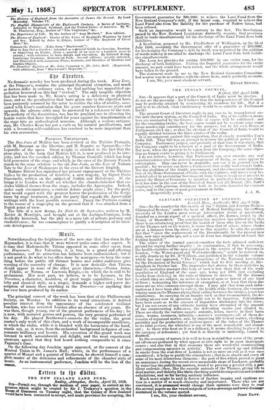tr#t fil4patrt5.
No dramatic novelty has been produced during the week. King Lear, at the Princess's, remains the principal theatrical attraction, and much as doctors differ in ordinary cases, we find nothing but unqualified ap- probation bestowed on this last "revival." The only tangible objection that has been made to Mr. Kean's acting is a deficiency in physical force, and as the peculiarities that have given rise to the objection have been purposely assumed by the actor to realize the idea of senility, asso- ciated with Leaes confession that his years number fourscore years and upwards, the adverse critic may be answered by a reference to the text. The modesty of the decorations, too, has its practical use in silencing the hostile voices that have inveighed for years against the transformation of the stage into an arclimological museum. Although a zealous antiqua- rian, Mr. Charles Kean has put a curb on his natural predilections, and with a becoming self-confidence has resolved to be more important than his own accessories.
PARISIAN THEATRICALS.
The Don Juan of Moliere has been revived at the Theatre Francais, with M. Bressant as the libertine, and M. Regnier as Sganarelle,—the Leporello of the opera Great weight is attached to the fact that the prose play, in the form that Moliere left it, is now produced in its inte- grity, and not the versified edition by Thomas Corneille which has long held possession of the stage, and which, in the eyes of the literary French stands in the same relation to the old .Don Jam, as the Bear of Nahum Tate to the Lear of Shakspeare in the eyes of the literary English.
Madame Ristori has signalized her present engagement at the Theatre Italie,: by the production of Giuditta, a new tragedy, by Signor Paolo Giacometti, written on the subject of Judith and Holofernes. If she brings it to London we shall see whether the chamberlain-law that ex- cludes biblical themes from the stage, includes the Apocrypha. Indeed, under such circumstances, a curious debate might arise ; for the party that would regard with the greatest horror the profanation of the Serip- tures by stage treatment, is just the party that regards the Apocryphal writings with the least possible reverence. Fancy the Puritans coining to the rescue of a stage-play on the ground that it was attacked from a Popish point of view.
The title of a new drame, La Nuit du 20 Septembre, written by M. Xavier de Montepin, and brought out at the Ambigu-Comique, looks decidedly historical, but the plot is a mere tale of private jealousy and vindictiveness ; far too commonplace to justify a description of its intri- cate development.


































 Previous page
Previous page